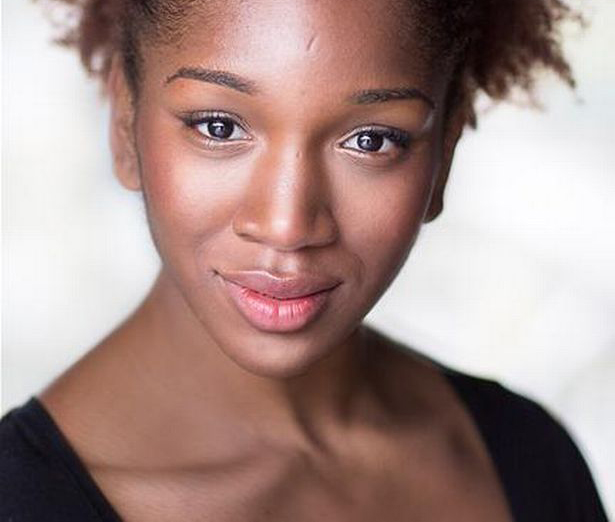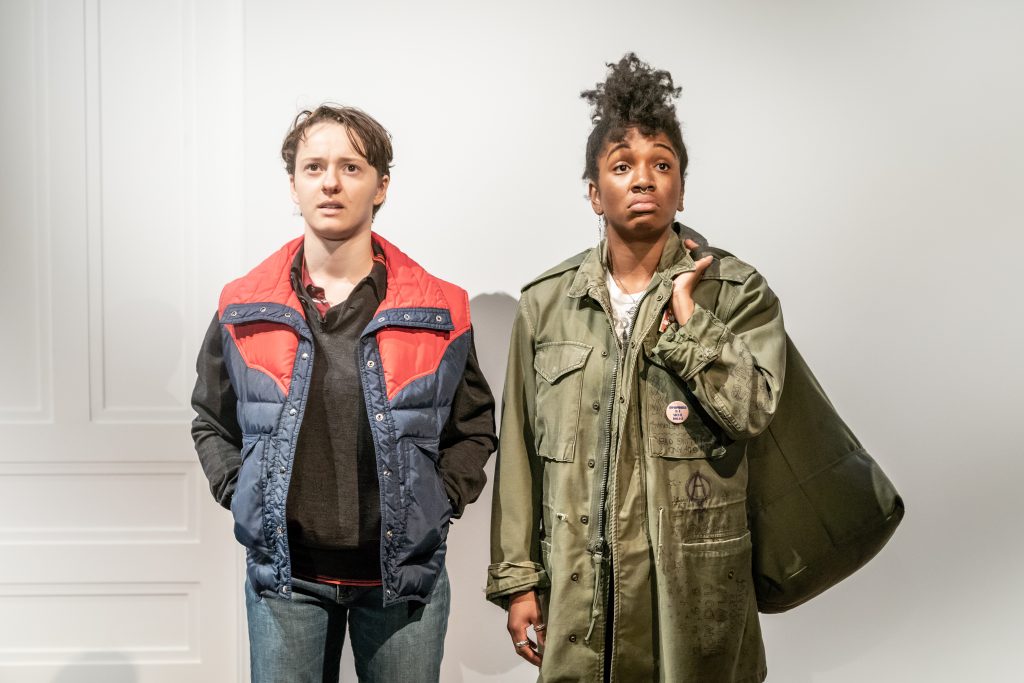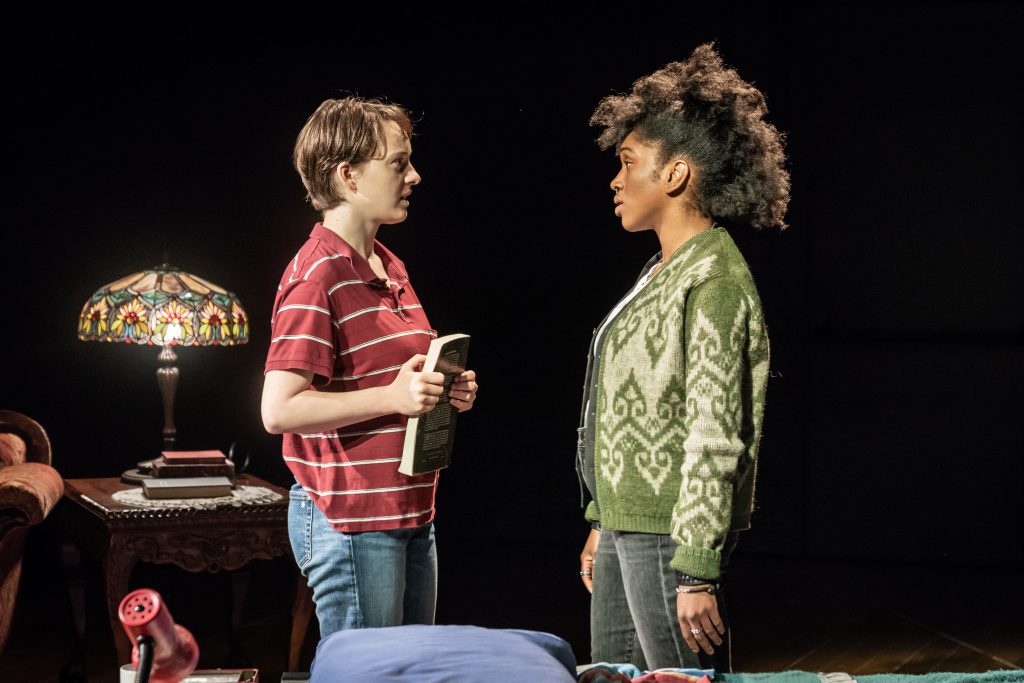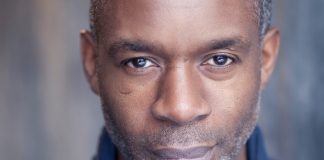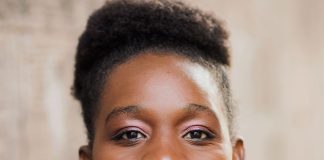Afridiziak Theatre News had a quick chat with Cherrelle Skeete about her life as an actress and her new role in five times Tony Award winning Broadway musical, Fun Home now on at The Young Vic.
What can you tell us about Fun Home and your role as Joan?
This show is so special not only considering all the accolades but really because of the themes; this is a story that we don’t often get to see in terms of a complex father and daughter relationship specifically from a masculine woman’s perspective. We get to see Alison at different stages in her life dealing with her identity especially in correlation to her father who couldn’t connect with his own identity fully. I play Joan who is a part of Middle Alison’s storyline in the play, she becomes Alison’s girlfriend and encourages her to connect to who she really is. My character is a catalyst for Alison to step out into the world as opposed to staying in her small-town mentality.
Do you have to sing in the show, how did you prepare for that?
Yes, I do, I sing a little bit anyway, I like to think of myself as an undercover singer. I love to surprise people in shows with my singing it is funny to see people’s reactions they are always like ‘oh wow you can sing!’ For this character I enjoyed learning more about Joan and seeing how comfortable she is in her own skin. That’s a nice glove to put on when I take on the role, she’s rooted in her easy-going being. Connecting to that part has been a really great experience, I’ve also really enjoyed discovering more of the imagery from the period of Middle Alison’s life and getting to know more about the movement back then with LGBT and women’s rights. Joan is such an activist! She really wants to speak up for her existence and for others who are also marginalized. It really corresponds with my own politics and the activism that I am passionate about. Getting into the part has been affirming and engaging as I’m the type of person who wants to speak up for others.
Getting into the part has been affirming and engaging as I’m the type of person who wants to speak up for others.
What sort of activism are you passionate about?
I’m one of the founders and Creative directors for Blacktress UK, a black women’s support network and group for black actresses who are just starting out in their careers or discovering acting later in life. It’s place where black women can meet and learn from each other and we have a meetup at least once a month to build community and sisterhood. I think it’s important especially considering all the things that have been happening in the last few months and years in this country. Reflecting on events that have happened, like Grenfell for example. That was such an atrocity and had such a massive impact on the communities across London and the UK. Before we had already seen how so many services were and still are being cut; women’s services, youth services, community programs, and so much in the arts and creatives spaces is being cut and closed as well.
All of this is only working to have a negative impact on local communities, our society and this generation of young people coming up. Community is so important as it builds a sense of belonging and good self-esteem within our youth, and also has an impact on mental health when people don’t feel so isolated as they are increasingly feeling nowadays. It’s so important that we all have safe spaces to connect and help each other and find each other. Everybody needs and deserves a safe space.
Do you feel that acting has been your safe space, a place for you to build community?
I’m an actress but I’m an artist more than anything else and I feel that art manifests itself in so many different forms on a day to day basis through music, dance, poetry, theatre, and film. I have been so lucky that acting has been a way for me to communicate with others and given me the ability to be creative and live via my creativity, I’m very fortunate to be able to do that.
How did you start acting?
There are many ways to get in, but my access was through drama school, I applied through UCAS and the second time I auditioned I got in to Central School of Speech & Drama, after graduating I have been grafting ever since. Acting is a tough journey, one that is never easy. You must have resilience and grow a thick skin. My advice to young ones trying to get through is to build on your sense of self inside and outside of the auditions and rehearsals, on and off stage. So, when you enter those spaces you are prepared for rejection, a no doesn’t define you. You have to know who you are.
For you what was your biggest yes?
I think my biggest yes was when I got my first job at the National Theatre in The Amen Corner as that was my first experience being involved with a theatre company that was predominantly black. Being in a production where everyone looks like you and that is the norm, where you don’t feel like the ‘other’ was a really interesting experience. Especially with so many black actresses like Marianne Jean-Baptiste, Sharon D Clarke and Cecilia Noble leading the company and production, that was huge for me, building those intense relationships onstage. For me as a young black actress it was all really valuable to me.
What’s been your most challenging experience?
I’d say the last role that I did in the Phlebotomist where my character had developed Huntingdon’s disease which is an incurable degenerative disease. In my research for the role I learnt so much about the disease, it’s so upsetting. I really wanted to stay true to the character and respect the dignity of sufferers. That was a really challenging role where I had to physically play this part with as much honest and dignity as I could to make it believable whilst portraying what real sufferers are going through. Also playing Abigail Bissette in Call the Midwife was hard when I played a character that loses a child. When you play these parts that reflect the real-life challenges that people are facing everyday all over the world you want to honour them and respect their stories. People will have watched me play this part and connected with the story in a way I can’t imagine so I wanted to do my best to honour them.
Would you like to do more TV?
The more you do it the better you get. As an actress I rely on my craft and keep learning as I keep going. TV is a different machine from the stage, but I love both. What’s powerful about being on the screen is it can reach a wider set of people, but the beauty of the stage is like a ghost, a whisper. It’s performed and then disappears, the specific group of people who have come to see you on stage know about it and we share something special on that night of the performance, after that it’s gone. Every performance in the theatre is unique in its own way each night.
Are you tempted to move to the US?
Only for the right role. On a global scale whenever we see the black experience its normally from an American perspective and I think we need to see and hear more from the black British experience and our voices. We have been here for a long time and have our own stories and history very separate from America, their story is not ours. I want to see the story of the girl who moves from Birmingham to London to chase her dreams. Being in Lenny Henry’s biopic, Danny and The Human Zoo was so special for me, being in that Jamaican family from Dudley.
Before then when do ever get to see that type of family on TV?
The few times we do see the black British experience its normally from London, which is not bad, but I want to see the Black British experience across all of the UK – from the North and the Midlands, across Bristol, Wales and hey Ireland too.
You must have resilience and grow a thick skin. My advice to young ones trying to get through is to build on your sense of self inside and outside of the auditions and rehearsals, on and off stage.
I love James Baldwin, August Wilson, and Lorraine Hansberry I love them all but where are the black British playwrights? Thankfully the Bush Theatre revived Leave Taking written by Winsome Pinnock over 30 years ago. We need more of that. That’s my story, my mum’s story, and my grandma’s story. It was amazing to go and see that play, and chilling to see Jamaican traditions on stage and to see it all as a British experience. It shows how much we need to highlight our experience as we don’t do it enough as black British people. In the wake of the Windrush scandal now is the time, we have so many important stories to hear about from Caribbean and African perspectives in Britain.
Look at Shebeen and The Secret Lives of Baba Segi’s wives and Ile La Wa these are important plays and we need more of them. We are everywhere, and I want our stories to be seen as part of the British experience and to become normalised in TV and theatre. Black British people must invest in our stories or we risk erasure or adopting this other voice from America that is not necessarily ours. It’s so important for black people to speak up and create more for ourselves because nobody else is going to do it for us. American pain is different to ours. We have to be experts of our own existence!





















